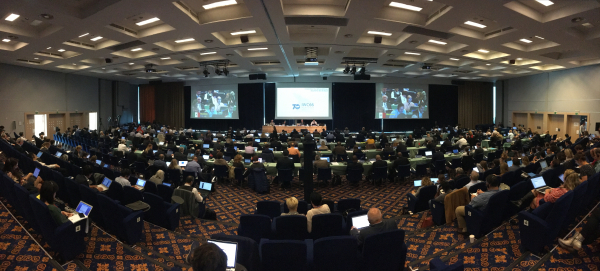Five Resolutions Adopted on Day Four of the IWC Plenary
Day Four began with a discussion on special permit whaling, also known as scientific whaling. The different views within the IWC on this subject are well documented and complex discussions today included debate on whether lethal sampling is required to achieve the objectives of previous and current special permit whaling programmes.
Safety at sea was also discussed, and the Commission reiterated that international and domestic maritime law should be respected by all parties, and no activities should be undertaken that pose a risk to human life or the marine environment.
An update was given on the three existing Conservation Management Plans (CMPs): for western North Pacific gray whales, south western Atlantic and south eastern Pacific southern right whales. A new CMP was instigated for the franciscana dolphin of south eastern South America, and agreement reached to continue discussions on the Arabian Sea Humpback, as another potentially good candidate for a CMP.
Discussions concluded on five Resolutions which were opened earlier in the week. Consensus was achieved on a Resolution on Effectiveness of the IWC and a comprehensive, independent review will be conducted during the intersessional period.
Governments on all sides of the scientific whaling debate highlighted the positive and constructive spirit of negotiations on a Resolution on Improving the Review Process for Whaling under Special Permit, but ultimately agreement could not be reached and the Resolution was put to a vote which adopted the Resolution with 34 yes votes, 17 no votes and 10 abstentions. Amongst the measures included is the establishment of a new Commission Working Group to consider Scientific Committee reports and recommendations on this issue.
A Resolution on Food Security was deferred for further intersessional discussions, aiming to bring a new Resolution to the next meeting of the IWC in 2018.
A Resolution on Cetaceans and Ecosystem Services considered the contribution made by cetaceans to the marine ecosystem. This was adopted by vote, with 36 governments voting yes, 16 voting no and 9 abstentions.
Also put to vote was a Resolution on the Minimata Convention on Mercury. This was adopted with 38 yes votes and 23 no votes.
Despite different views on the IWC's jurisdiction regarding small cetaceans (dolphins and porpoises) consensus was not blocked on a Resolution on the Critically Endangered Vaquita. The vaquita is a small porpoise that lives only in the Gulf of California. Now numbering less than 59 animals, the vaquita faces imminent extinction unless more is done to protect it from bycatch in illegal gillnets, and the Resolution calls on governments to act now.
Opposing views were expressed on the commercial whaling conducted by Iceland under an Objection to the Moratorium, and Norway under a Reservation to it.
As part of an agenda item on the Revised Management Programme, a report was provided on the Scientific Committee's Implementation Review programme: work to assess and update information on the structure and status of individual whale populations which is now focused on North Atlantic minke and North Pacific Bryde's whales. An Implementation Review on North Atlantic fin whales finished earlier this year.
Finally, the Commission commended a varied programme of work to extend collaboration with other organisations, acknowledging that this was the only way to tackle global problems like bycatch, marine debris and collisions between whales and ships.

